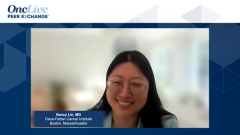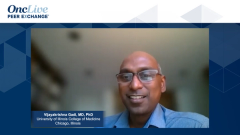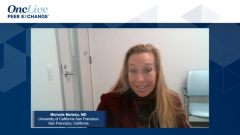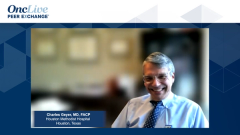
HER2+ Breast Cancer: Updates on HER2CLIMB and CNS Disease Management
A brief review of updated data from HER2CLIMB and discussion on which agents may be best for treating patients with CNS disease.
Episodes in this series

Vijayakrishna Gadi, MD, PhD: Nancy, there were great data from this woman named Nancy Lin presented at San Antonio Breast Cancer Symposium. Maybe you could tell us firsthand what you presented?
Nancy Lin, MD: We presented an update with additional follow-up of the HER2CLIMB trials, specifically restricted to the CNS [central nervous system] subset. If you recall, HER2CLIMB had about 600 patients enrolled. About 300 of those patients had brain metastases, including 174—so a very substantial portion—who had active brain metastases entering the trail. Updated overall survival data, as well as other end points, were presented. The most striking finding was that there was a further improvement in overall survival as seen from the first initial presentation.
Now the median overall survival delta is over 9 months in the CNS subset, so from 12.5 to 21.6 months. Before it was 12 to 18 months in the overall CNS subset. If you look at the patients with active brain metastases—HER2 [human epidermal growth factor receptor 2]–positive, prior trastuzumab taxane, pertuzumab, and T-DM1 [trastuzumab emtansine]—the median overall survival went from 11.8 to 21.4 months. These are striking survival differences in a patient population that was previously written off as not fit for clinical trials. You can’t use the excuse anymore that patients don’t survive long enough; therefore, we can’t enroll them in clinical trials. These are patients who are heavily pretreated who had active brain metastases and survived almost 2 years from trial entry. If we’re not going to enroll those patients in trials, we might as well not do any trials of metastatic triple-negative breast cancer, right?
The message is that systemic therapy has the potential to have dramatic survival improvements. If we look at trials of whole-brain radiation vs SRS [stereotactic radiosurgery], there’s no survival difference with whole-brain radiation. To see a 9-month absolute delta is unprecedented in this patient population.
Vijayakrishna Gadi, MD, PhD: Nancy, at the meeting there was also talk and interesting signals. We mentioned this earlier, with trastuzumab deruxtecan maybe having actual CNS activity. Maybe you can speak to that as well.
Nancy Lin, MD: Historically we’ve thought that ADCs [antibody drug conjugates] don’t work in the CNS [central nervous system] because they’re big and bulky, but that’s been challenged because we have multiple reports that T-DM1 [trastuzumab emtansine] has CNS activity. There’s been a lot of interest in determining whether T-DXd [trastuzumab deruxtecan], which obviously we know is better than T-DM1 [trastuzumab emtansine], also has CNS activity.
That’s been looked at in a couple of different ways. DESTINY-Breast03 looked at it indirectly. Most patients didn’t have active brain metastases; they were treated stable. But in that subset the PFS [progression-free survival] definitely favored T-DXd [trastuzumab deruxtecan]. For what it’s worth, there were CNS responses seen in the T-DXd [trastuzumab deruxtecan] arm. Because it’s a randomized trial, you could compare it with the CNS response rate in the T-DM1 [trastuzumab emtansine] arm, and it was substantially higher. That suggests it’s not just previous radiation because you would imagine those things would be balanced out by randomization. That was very interesting.
There were a number of phase 2 trials or retrospective experiences looking at T-DXd [trastuzumab deruxtecan] in different types of brain metastases populations, all with a very consistent message that CNS objective responses are seen and were fairly convincingly attributable to the T-DXd [trastuzumab deruxtecan]. This is a real paradigm shift, that ADCs as a class are likely active in the CNS. We have data also from Andrew Brenner’s group with sacituzumab preop trial—preop meaning preop to craniotomy, where their group showed therapeutic levels of SN-38 in the CNS with sacituzumab. I believe there’s going to be a class effect of ADCs in the CNS, and we should think about it as we’re thinking about developing other ADCs.
Charles Geyer, MD, FACP: These studies should heighten the interest in the KATHERINE replacement studies because the issue with a little disappointment on KATHERINE was that it didn’t look like T-DM1 [trastuzumab emtansine], and that potentially curative population was effective in preventing the brain metastases. That was the 1 unmet need in KATHERINE, that it didn’t seem to have impact on brain metastases. For about half the patients with events, brain metastases were part of it. Clearly the CompassHER2 RD [residual disease] study that’s being led by Alliance for Clinical Trials in Oncology…are taking T-DM1 [trastuzumab emtansine] to see how we do with adding tucatinib. Makes a lot of sense; it’s a very interesting study.
The other 1 out there is the DESTINY-Breast05 comparing T-DM1 [trastuzumab emtansine] with T-DXd [trastuzumab deruxtecan]. These are encouraging data that perhaps we’re going to see this unmet need addressed in both trials. It’s encouraging, but people doing clinical trials who have patients with the non–PCR [polymerase chain reaction] ought to be participating in 1 of these trials, because we need to learn this very important information. It’s the last step in the early breast cancers.
Nancy Lin, MD: I agree. The patients with metastatic HER2+ disease we’re seeing have de novo disease or relapse in their CNS. Those are the 2 most common metastatic populations if we look at newly diagnosed HER2+ patients with metastatic disease these days.
Transcript edited for clarity.










































